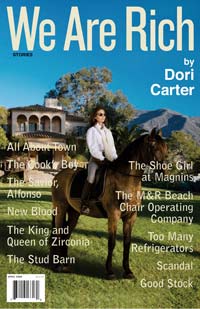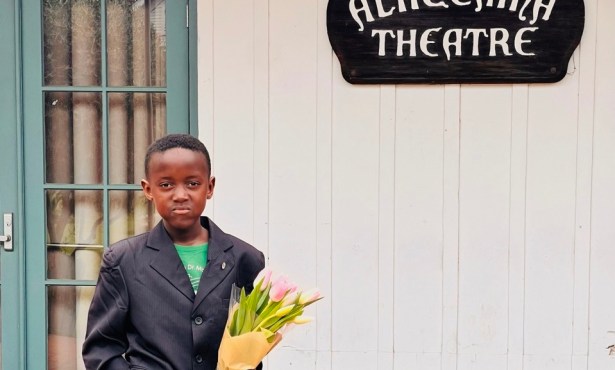Dori Carter’s We Are Rich Lampoons Montecito Wealth
New Comic Novel Delivers Shock of Recognition

In this, her bluntly titled second novel, Dori Carter describes with comic skill the mostly downward trajectories of a few upper-crust families in a woodsy, wealthy seaside enclave called Rancho Esperanza, which is Montecito, thinly disguised. We Are Rich is presented as a series of interwoven stories, each with its own narrator. In an unusual touch, each narrator’s account is accompanied by his or her photo; the models, listed in the acknowledgements, appear to be friends of the author.
The novel is bookended by two society page columns: The first describes a party that takes place at the Casa de las Flores estate during WWII, attended by Charles Lindbergh and Mario Lanza along with several of Rancho Esperanza’s elite. The second, by a more contemporary columnist, recounts the events of a 1986 chaparral fire that took out some of the homes of the prominent characters while sparing others, in the capricious way with which Santa Barbarans have become all too familiar lately.

In between, we hear from old-money heirs, a dot-com millionaire, and a self-made businessman haunted by the Holocaust his family barely escaped, as well as from their spouses, children, and servants. We Are Rich is Upstairs, Downstairs meets Rashomon meets Brideshead Revisited, all tied up into a neat little bedroom farce.
In a telephone interview, Carter called We Are Rich “an American cautionary tale,” the moral of which could be, “You can inherit money, but not success.” What happened in Montecito, “happened all over the U.S.,” she said. “When I was a kid, there was a secure upper class in America that went to the same clubs and went through the same social rituals, the ones who went to prep schools and Ivy League colleges and went there because their father and grandfather went there.” According to Carter, the demise of WASP culture-thanks to the GI Bill, among other things-“unanchored all their rules, and what replaced those rules were a variety of status symbols that are always changing.” What this book is really all about, she said, is “how American society changes.” It is a theme she has visited before, notably in her first novel, Beautiful Wasps Having Sex, which spent several weeks on the Los Angeles Times bestsellers list.
Carter has lived in Montecito since 1986 and insists that none of her characters are based on actual people, but are instead amalgams and creatures of her imagination-perhaps from the terrace of Arpeggio, one of the favorite breakfast haunts of Rancho Esperanza’s cafe society. She skewers new and old money alike, but not without sympathy. People are not necessarily who they appear to be in We Are Rich, which is sometimes a point in their favor; Carter frequently catches and releases the victims of her satirical wit. One of the charms of the interwoven-stories device is that each character appears different from the point of view of different narrators. Another success of the form, at least as Carter wields it, is that most of the individual narratives are well-crafted short stories in their own right, with their own punch lines.
The plot contains many well-executed surprises, though Carter-a former screenwriter, like her famous X-Files creator husband Chris Carter-claimed she didn’t plan these twists in advance. Writing for television, she said, “You always have to have an outline. But when I sat down with this one, I didn’t know what was going to happen. All writers tell me that one of the great pleasures of writing is that you don’t know what’s going to happen. If you can just kind of tune into that flow, your unconscious will do it for you.” For a few light-hearted hours, you can let Dori Carter’s unconscious-and her knowledge of the territory-do it for you.
4•1•1
We Are Rich is available at Chaucer’s Books and Tecolote Book Shop, as well as online. For more information, visit otherpress.com.



